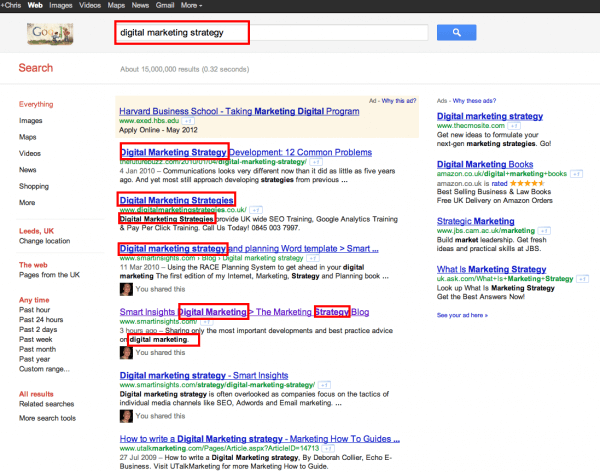4 Things to consider when writing page titles
In our recent post giving 21 simple SEO ideas we said how important titles are. Here we go into a bit more depth to show how non SEO specialists writing web copy can improve SEO through refining their page titles within the SERPs.
Titles are undoubtedly a primary signal for each page that search engines use to determine the focus of a pages content. There is no real black vs white hat techniques when it comes to optimising page titles, but there is a suite of best practices you should follow to ensure you are making the most of this element of a page.
Page titles often become the problem of "SEO teams" or agencies which tend to be technically led than creatively.
However, there is an argument that some of the best people to work on page titles (and meta descriptions) should be those that were highly skilled creatives for print / broadcast advertising or journalists. The trick is to get the balance right between writing for Google and it's searchers and writing engaging copy which works for readers and helps support the goals of the website. A great article discussing this balance is the famous "this boring headline was written for Google" from the New York Times.
This shows it's not just about using the right combination of keywords, it's about engaging the audience and using an appealing offer or call-to-action. After-all, when you are displayed against 10+ other websites with 70c haracters and a small description as your 'advert', why would people choose you?
We think these are the key issues to consider for page titles, please add your thoughts on other approaches which you have found that have helped.
1. Keep titles "short and sweet"
There are a number of articles that state a character limit on Page Titles, but there is no hard and fast rule for this. Most people would recommend page titles are no longer than 70 characters (including spaces), this is based on the amount of text Google will display before adding "..." on Search Results Pages. Keeping page titles simple helps stay focussed on the keywords that matter for that page and will mean users can actually make sense of them when they are scanning results pages too.
 2. Make them relevant
2. Make them relevant
As for all engaging content, relevance is absolutely key. Making sure you page titles are relevant to the content on the page and target the primary keyword focus of the content then you have ticked the right boxes.
Do not try and include lots of similar keywords, pick the main one or two and focus on them. Remember Google will make keywords used bold in the result (see screenshot to the right) which always helps catch peoples attention, the more relevant you are the more likely you search result is going to stand out.
It can help for relevance and with Google to use your target keywords leftmost in the title.
3. Think about users
Remember your page title serves customers in two unique ways, it is what they read when the glance through Search Results Pages, so ensure your title is relevant & stands out to attract the clicks. When people share or bookmark your page it will often use the page title as the text to display to the users it is shared with so make sure it is useful in that context too!
4. Do not have duplicate page titles
Duplicate page titles will raise alarms with search engines as duplicate content it is also a lost opportunity for ranking.
While you shouldn't have a need to have two pages with such similar content that the page title will be the same, do think about how you could take a different spin and target different keywords.
Finding weak page titles
There are a number of ways you can identify weak page titles on your website, this should be done as part of any quarterly / half yearly on-site SEO audit. Tools like:
all have a mechanism to identify long / duplicate page titles which can help create your to-do list moving forwards.
Remember to do your keyword research (using the Google Keyword Tool) when considering page titles, focus on those you believe you can rank for considering the competition etc.







